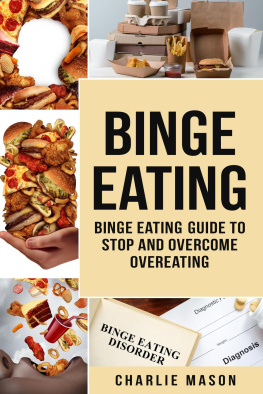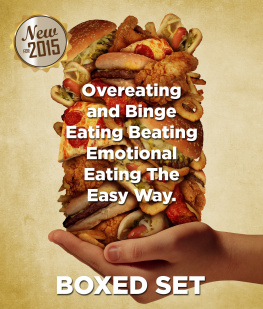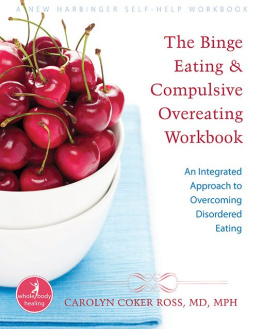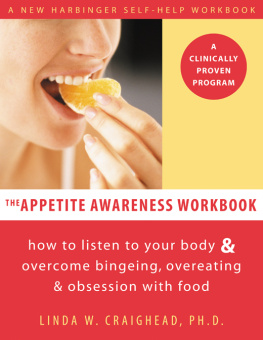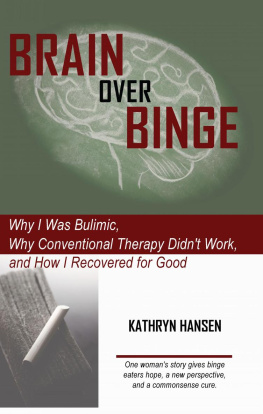This book is dedicated to allthose who fight eating disorders on a daily basis. With hope, a great source ofsupport and correct course of treatment, life can be normal again.
Chapter 1- What Is Binge Eating and the Binge Eating Cycle?
Holidaysand family gatherings often serve as occasions for even those without foodissues to overeat. There's nothing particularly worrisome about having an extrapiece of pie now and again, but when uncontrollable consumption becomes aregular fixture in your life, you could be engaging in an activity known asbinge eating. The good news is that there are ways to break out of the bingeeating cycle. With treatment and support, even the most food-addictedindividuals can find hope.

CommonBinge Eating Features
Thebasic concept behind binge eating is compulsion. More often than not, thiscompulsion is driven by depression or, at the very least, extreme mood swings.The desire to turn to food is one that often has its roots in childhood orone's early 20s. Gorging episodes usually last two hours or so, though somebinge eaters may spread their episodes throughout the day. If you start eatingbased on cravings not hunger and continue eating well past the point whereyou are full, it could be a sign of binge eating.
TheBinge Eating Cycle
Bingeeating provides comfort for a certain amount of time, but it is almostinevitably followed by feelings of guilt and regret, a pattern of weight gain,and increased self-loathing. Since individuals who binge eat use food as anescape from these very feelings, it's easy to see how a vicious cycle canbegin. An outsider may find it hard to imagine why someone who feels bad abouttheir weight would turn to food to solve those feelings, but it is a verycommon psychological response. Without therapy, it can be extraordinarilydifficult to break the cycle.
CommonSymptoms
Ifyou aren't sure whether you or someone you love suffers from a binge eatingdisorder, here are some of the most common symptoms. If you experience many ofthese symptoms, it could be a sign that you need help:
Youreating habits lead to embarrassment and shame
Youfeel out of control when eating your favorite foods
Youfeel panicked in situations such as a trip to the grocery store
Youcontinue to eat after your stomach is full
Youhide food from others and eat in secret
TheEffects of Binge Eating
Unfortunately,a real binge eating disorder cannot be ignored. Not only does a regular patternof food abuse often lead to obesity, but it can lead to a host of physical andemotional problems. Health issues are common amongst people with food issues,some of which can be very serious. Depression, Type 2 diabetes, high blood pressure,high cholesterol, certain cancers, joint pain, and gall bladder disease are buta sampling of the problems that can accompany a binge eating disorder.
Causes
Dueto the prevalence of obesity and obesity-related diseases in America, doctorsand scientists have placed a great deal of focus on finding the root causesbeneath binge eating and food compulsion. Genetics, experiences, and emotionalmakeup are usually at the heart of any serious eating disorder. Biologically, adysfunctional hypothalamus gland can impair a person's ability to understandwhen they are satiated. Some studies have shown that serotonin deficienciescould be to blame for eating disorders in many cases.
Notall binge eating disorders are rooted in biology, of course. At a time whereobesity is a widespread cultural problem, the pressure to be thin has neverbeen greater. Women, particularly, must face a society with little tolerancefor even mild amounts of extra weight. Additionally, when parents use food toreward their children, it can create deep psychological connections that can bealmost impossible to break without help.
Fightingthe Urge to Binge
Acomprehensive approach to solving a binge eating addiction should includeprofessional therapy and in some cases prescribed medication. That said,there are some things you can do on your own to curb your tendency to binge.Here are five effective strategies for overcoming the urge:
Findan alternative Since the majority of binge eaters do so because it helps themmanage stress, one of the key elements of beating the addiction lies in findingalternative methods of coping. Exercise, deep breathing, music, and distractingactivities can all help you manage stress in a healthy, sustainable way.
Eatregularly Binge eaters often have very irregular eating schedules. Forinstance, there may be no planned mealtimes. By cutting back to threepre-defined meals per day, sprinkled with a set amount of health snacks inbetween, you can gain a measure of control over your eating habits. A regulareating schedule can also help you avoid the extreme cravings that may accompanyskipped meals.
De-Clutteryour home Throw out all of the "bad" food in your home. If yourcupboards are stocked with Twinkies and Doritos, it will be that much harder towalk the straight and narrow path.
Stopfollowing fads The process of losing weight should be a gradual, slow one.Concentrate on getting enough exercise, eating healthy and nutritious meals,and stop looking for the next magic solution.
Getto know your body Binge eaters and others with compulsive food disordersoften have trouble telling the difference between hunger and cravings. Learnwhat it means to actually be hungry and, by extension, what it feels like to besatisfied. Use these physical sensations rather than your emotions to guideyour eating.
Chapter 2- Signs and Symptoms ofBinge Eating Disorder
Everyoneovereats now and then by taking a second helping or ordering their favoritedessert when they are already full. However, binge eaters overeat consistentlyand are not able to control their habit of overeating. They eat to comfortthemselves when they feel stressed in order to deal with undesirable emotions.Yet, while binge eating may be comforting for a short bit of time, afterwards theytend to feel worse than before they ate.
BasicSymptoms of Binge Eating
Compulsiveovereating normally begins in the late teenage years or in young adulthood, andit often starts after a strict diet. A binge eating occurrence usually lasts nomore than a couple of hours, but there are some individuals who binge regularlythroughout the day. A person who is a binge eater does not have to be hungry toeat and can even eat when full. Sometimes they eat extremely fast, which canmake them feel as if they have not eaten. Common symptoms include:


